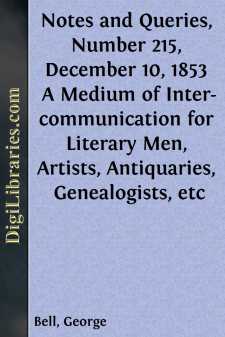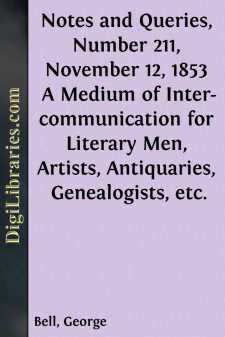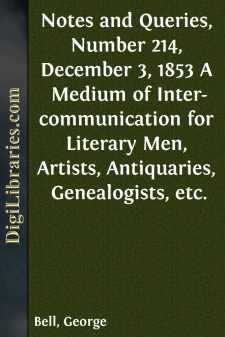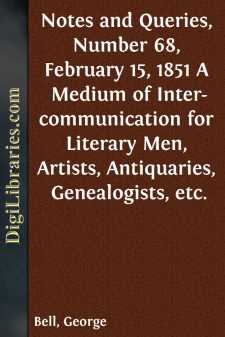Categories
- Antiques & Collectibles 13
- Architecture 36
- Art 48
- Bibles 22
- Biography & Autobiography 813
- Body, Mind & Spirit 142
- Business & Economics 28
- Children's Books 17
- Children's Fiction 14
- Computers 4
- Cooking 94
- Crafts & Hobbies 4
- Drama 346
- Education 46
- Family & Relationships 57
- Fiction 11829
- Games 19
- Gardening 17
- Health & Fitness 34
- History 1377
- House & Home 1
- Humor 147
- Juvenile Fiction 1873
- Juvenile Nonfiction 202
- Language Arts & Disciplines 88
- Law 16
- Literary Collections 686
- Literary Criticism 179
- Mathematics 13
- Medical 41
- Music 40
- Nature 179
- Non-Classifiable 1768
- Performing Arts 7
- Periodicals 1453
- Philosophy 64
- Photography 2
- Poetry 896
- Political Science 203
- Psychology 42
- Reference 154
- Religion 513
- Science 126
- Self-Help 84
- Social Science 81
- Sports & Recreation 34
- Study Aids 3
- Technology & Engineering 59
- Transportation 23
- Travel 463
- True Crime 29
Notes and Queries, Number 190, June 18, 1853 A Medium of Inter-communication for Literary Men, Artists, Antiquaries, Genealogists, etc.
by: George Bell
Categories:
Description:
Excerpt
ON THE USE OF THE HOUR-GLASS IN PULPITS.
George Herbert says:
"The parson exceeds not an hour in preaching, because all ages have thought that a competency."—A Priest to the Temple, p. 28.
Ferrarius, De Ritu Concion., lib. i. c. 34., makes the following statement:
"Huic igitur certo ac communi malo (the evil of too long sermons) ut medicinam facerent, Ecclesiæ patres in concionando determinatum dicendi tempus fereque unius horæ spatio conclusum aut ipsi sibi præscribant, aut ab aliis præfinitum religiosè observabant."
Bingham, commenting on this passage, observes:
"Ferrarius and some others are very positive that they (their sermons) were generally an hour long; but Ferrarius is at a loss to tell by what instrument they measured their hour, for he will not venture to affirm that they preached, as the old Greek and Roman orators declaimed, by an hour-glass."—See Bingham, vol. iv. p. 582.
This remark of Bingham's brings me at once to the subject of my present communication. What evidence exists of the practice of preaching by the hour-glass, thus treated as improbable, if not ridiculous, by the learned writer just quoted? If the early Fathers of the church timed their sermons by any instrument of the kind, we should expect their writings to contain internal evidence of the fact, just as frequent allusion is made by Demosthenes and other ancient orators to the klepshydra or water-clock, by which the time allotted to each speaker was measured. Besides, the close proximity of such an instrument would be a constant source of metaphorical allusion on the subject of time and eternity. Perhaps those of your readers who are familiar with the extant sermons of the Greek and Latin fathers, may be able to supply some illustration on this subject. At all events there appears to be indisputable evidence of the use of the hour-glass in the pulpit formerly in this country.
In an extract from the churchwardens' accounts of the parish of St. Helen, in Abingdon, Berks, we find the following entry:
"Anno mdxci. 34 Eliz. 'Payde for an houre-glasse for the pulpit,' 4d."—See Hone's Table-Book, vol. i. p. 482.
Among the accounts of Christ Church, St. Catherine's, Aldgate, under the year 1564, this entry occurs:
"Paid for an hour-glass that hangeth by the pulpitt when the preacher doth make a sermon that he may know how the hour passeth away."—Malcolm's Londinium, vol. iii. p. 309., cited Southey's Common-Place Book, 4th Series, p. 471.
In Fosbrooke (Br. Mon., p. 286.) I find the following passage:
"A stand for an hour-glass still remains in many pulpits. A rector of Bibury (in Gloucestershire) used to preach two hours, regularly turning the glass. After the text the esquire of the parish withdrew, smoaked his pipe, and returned to the blessing."
The authority for this, which Fosbrooke cites, is Rudder's Gloucestershire, in "Bibury." It is added that lecturers' pulpits have also hour-glasses The woodcuts in Hawkins's Music, ii. 332., are referred to in support of this statement. I regret that I have no means of consulting the two last-mentioned authorities....












